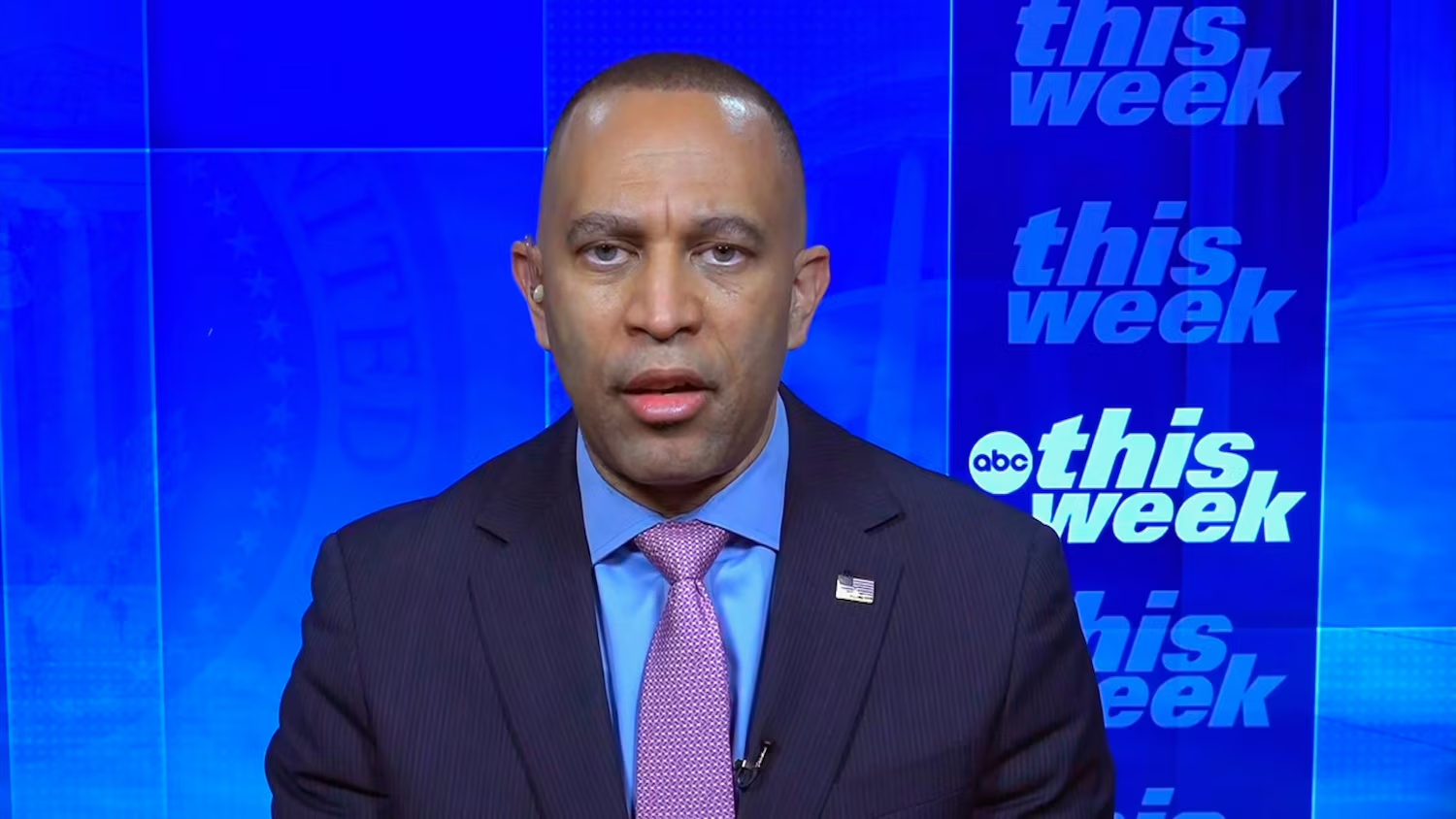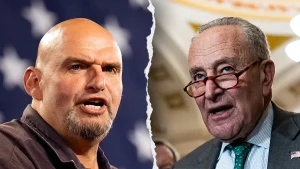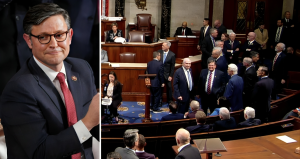A Turning Point in Washington
House Speaker Mike Johnson walked into the Capitol on Wednesday night with something rare in Washington these days: momentum. The shutdown had dragged on for weeks. The pressure mounted every day. Millions of Americans felt the impact. Yet through the noise, Johnson stayed focused. He kept repeating the same message: Democrats caused this mess, and Republicans were going to clean it up.
The vote proved him right.
Six Democrats crossed party lines to help Republicans pass the measure needed to move the government toward reopening. It was a narrow but meaningful break. After weeks of gridlock, the dam finally cracked. And for the first time in the entire ordeal, Democrats openly defied their own leadership. That speaks louder than any press conference ever could.
How Democrats Lost Control of Their Own Shutdown
For nearly a month, House Democratic Leader Hakeem Jeffries urged his caucus to hold firm. He claimed Republicans were responsible for the crisis. He said Democrats were fighting for “principle.” But behind closed doors, the strategy was obvious. He wanted leverage. He wanted headlines. And he wanted to appease the activist wing that dominates Democratic politics.
It didn’t work.
The longer the shutdown continued, the more the public grew frustrated. Food stamp delays hit the most vulnerable families. Airports grew chaotic. Military families waited in fear for their paychecks. Even Democrats in Congress began questioning why they were being told to hold the line while their constituents suffered.
Johnson highlighted those contradictions each day. He reminded Americans that Republicans had already passed a clean funding extension weeks earlier — one with no conservative wish list attached. It was straightforward. It simply kept the government open while Congress negotiated.
Democrats blocked it. Over and over.
That decision came back to haunt them.
The Vote That Broke the Stalemate
When the House voted Wednesday night, the chamber felt different. Everyone knew the shutdown was nearing its end. But the real shock came from what the vote revealed about internal Democratic tensions.
Six Democrats abandoned Jeffries and sided with Republicans to reopen the government. Two Republicans, surprisingly, voted with Democrats to keep the shutdown going — a move that raised eyebrows not only inside the GOP but in conservative households across the country.
When the dust settled, the tally was 222–209.
For Johnson, it was a defining moment. For Jeffries, it was an embarrassing one.
And for Democrats who had insisted for weeks that Republicans were the problem, it was an undeniable public fracture.
Johnson’s Message: This Never Needed to Happen
After the vote, Johnson didn’t gloat. He didn’t brag. He did what effective speakers do: he told the truth plainly.
“This chaos never had to happen,” he said.
And he’s right. Republicans had already voted on a temporary funding bill back on September 19. No special demands. No riders. No policy traps. Just basic funding to keep the country running.
Democrats rejected it fifteen times.
Fifteen.
But now, after weeks of pressure, hunger, missed paychecks, and stalled services, the same Democratic leadership that insisted on holding the government hostage was pretending to be the group that “saved” it.
Johnson didn’t let them rewrite history. Neither did the official GOP statement released shortly after the vote. It spelled out the harm caused by Democratic leaders who thought Americans could be used as bargaining chips.
And it reminded voters of something simple but powerful: “Democrats admitted they used the American people as leverage.”
That line will echo long after this shutdown fades from the headlines.
Why Democrats Finally Folded
Democrats didn’t suddenly discover bipartisan cooperation. They folded because the politics turned against them. Their strategy was falling apart. Their messaging crumbled whenever voters asked them the basic question: why did you vote to keep the government closed?
The shutdown hurt working families, federal employees, travelers, and military personnel. Democrats sensed the backlash growing. Polls shifted. Local media outlets started grilling them. Even their own Senate members began to break ranks earlier in the week.
That’s when the dam burst.
Once those defections happened, the House Democrats who crossed the aisle Wednesday night were simply acknowledging what everyone could see: Jeffries and Schumer lost control.
They miscalculated. They misread the public. And they underestimated Republicans’ resolve.
Trump Signs the Measure — and Ends the Games
After the House vote, the bill moved quickly. President Trump signed it late Wednesday night. With one signature, the shutdown began its final descent. Government funding was secured through January, and the long standoff reached its conclusion.
What stands out most is how simple the end really was. No complicated compromise. No sweeping reform. No sweeping concession from Republicans. Democrats got nothing.
It was all political theater.
And as Speaker Johnson made clear, Democrats dragged the country through a crisis that achieved no purpose at all.
Looking Ahead: A Warning for 2026
The shutdown leaves Democrats with a problem much bigger than a bad news cycle. They now face a midterm year with a divided caucus, a leadership team that failed publicly, and a record that Republicans will highlight again and again:
Democrats voted fifteen times to keep the government closed.
Older voters — the ones who vote most consistently, the ones who pay attention, the ones who live on fixed incomes — don’t forget things like that. They know what it means when a party uses federal paychecks, food assistance, and everyday life as leverage.
And they know who stood firm — and who didn’t.
Johnson emerges from this fight stronger than before. Democrats come out bruised, divided, and scrambling for a message that doesn’t involve blaming Republicans for a shutdown Democrats prolonged.
The political consequences are just beginning.

Emily Johnson is a critically acclaimed essayist and novelist known for her thought-provoking works centered on feminism, women’s rights, and modern relationships. Born and raised in Portland, Oregon, Emily grew up with a deep love of books, often spending her afternoons at her local library. She went on to study literature and gender studies at UCLA, where she became deeply involved in activism and began publishing essays in campus journals. Her debut essay collection, Voices Unbound, struck a chord with readers nationwide for its fearless exploration of gender dynamics, identity, and the challenges faced by women in contemporary society. Emily later transitioned into fiction, writing novels that balance compelling storytelling with social commentary. Her protagonists are often strong, multidimensional women navigating love, ambition, and the struggles of everyday life, making her a favorite among readers who crave authentic, relatable narratives. Critics praise her ability to merge personal intimacy with universal themes. Off the page, Emily is an advocate for women in publishing, leading workshops that encourage young female writers to embrace their voices. She lives in Seattle with her partner and two rescue cats, where she continues to write, teach, and inspire a new generation of storytellers.









